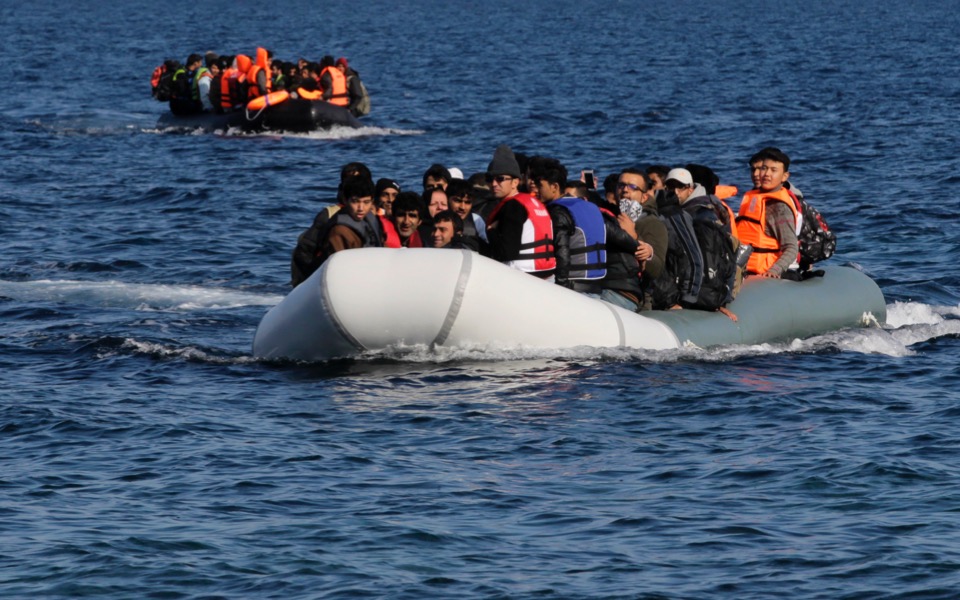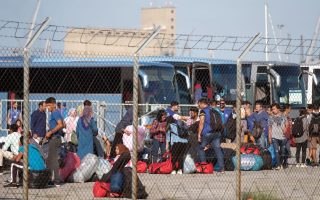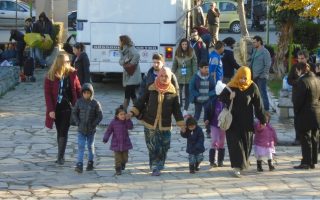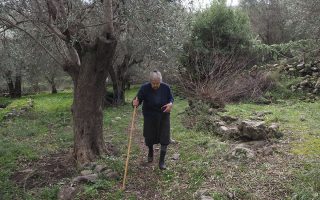Dealing with the migration-refugee challenge

The first news the prime minister heard when he got off the plane following a trip to Berlin on Tuesday, 30 August, was that 13 boats had reached the shores of northeastern Lesvos. En masse and in an organized manner, 530 migrants and refugees had arrived on the island, ramping up the already considerable pressure on the authorities and the local community. The Turkish Coast Guard had not responded to Greek requests to stop this wave of new arrivals.
What happened that day in the eastern Aegean starkly confirmed the concerns Prime Minister Kyriakos Mitsotakis had expressed to Chancellor Angela Merkel during their meeting in Berlin. It was the moment when the upsurge in mixed migrant flows broke on Greece’s shores, recalling the crisis of 2015.
A month earlier, Greece’s new government had inherited an impasse – a closed system of migrant/refugee inflows with virtually no outflows: The Balkan route had long since been shut down, and almost no returns were being made to neighboring Turkey. Our partners felt they had “done their duty” to Greece, demanding the immediate implementation of the EU-Turkey Statement. In the absence of a coherent European strategy to address the migration issue, the mechanisms in place for managing the situation fell well short of adequate. A fragmented ministry could not bring the required focus and force to bear on the problem.
An emergency meeting of the Government Council on Foreign Affairs and Defense was convened to discuss the upsurge. A package of seven measures was drawn up to tighten control of maritime borders, decongest the islands, accelerate returns to Turkey, support local communities and promote legislation streamlining asylum procedures – legislation that Parliament passed on Thursday.
The reality is that virtually every part of the state mechanism is involved in the issue. Individual responsibilities were assigned to the Interior Ministry for engaging municipalities and the Defense Ministry for coordinating transfers from the islands to the mainland, and of course for internationalizing the issue. This involves the promotion of Greece’s priorities, positions and appeals on the European and international levels. It is inextricably linked to – it complements and bolsters – the tireless efforts being made here at home.
It is now generally accepted that the reasons for and sources of the upsurge in migration flows lie outside of Greece. From this past June to October, flows increased by over 200 percent. Since July, 40,000 irregular migrants and refugees, including a large number of unaccompanied minors, have arrived in our country. New migration routes and geographical dispersion have taken migrants to Samothraki and Symi, and even to Agathonisi and Megisti.
This asymmetrical pressure on our country coincides with Turkey’s implementation of a new and very strict policy against refugees and migrants there, especially with regard to the more than 500,000 people who have descended on Istanbul. It also coincides with Ankara’s pursuit of strategic geopolitical objectives in the wider Eastern Mediterranean and the Middle East – in particular in Syria. And finally, it coincides with the tensions in EU-Turkey relations and the unpredictability of our neighbor’s geopolitical moves.
Ankara has increased both the intensity and frequency of its threats to “open the floodgates” to Europe. The repetition of these threats commits the Turkish leadership to this policy. And we must not underestimate the seriousness of this situation. Europe and Greece need to prepare for every scenario.
At the same time, it is clear that the better implementation of the 2016 EU-Turkey Statement, in spite of its serious weaknesses, is a key tool for both sides. And this is why the meeting with Turkish Interior Minister Suleyman Soylu, and deputy ministers of interior and foreign affairs, which took place on October 3 in Ankara, focused on creating and enhancing direct channels of communication and more substantial cooperation on what is, in the final analysis, a shared problem. We are determined to continue to communicate with the Turkish side at every opportunity in the context of implementing the EU-Turkey Statement.
Greece is committed to fulfilling its obligations through a firm policy on returns.
At the same time, we demand similar resolve from all sides. Turkey needs to break up trafficking networks and stop new migration routes from being created. The EU needs to lend practical support to the countries immediately affected.
At the recent meeting of the European Council, Prime Minister Mitsotakis stressed the urgency of the matter, firmly setting it at the top of the European agenda.
We must play an active role in shaping the new common policy on migration as the new Commission prepares to take up its duties. There have been positive developments: European Commission president-elect Ursula von der Leyen has called migration a high-priority issue, and vice president Margaritis Schinas’s portfolio will include migration.
Greece took the opportunity for a pre-emptive presentation of its key priorities in recent meetings with Schinas and the new home affairs commissioner, Ylva Johansson:
* Speedy completion of the Common European Asylum System.
* Effective implementation of the relocation policy for asylum applicants, based on burden-sharing among the member-states.
* Shaping of a strong and effective European mechanism for returns and expulsions of third-country nationals to countries of origin.
* Solidarity and support in dealing with the very important issue of unaccompanied minors.
* Continued funding.
* Securing increased funding in the EU budget currently under negotiation.
At the same time, to promote and strengthen Greece’s positions:
* We launched a trilateral initiative with Cyprus and Bulgaria to bring the Eastern Mediterranean migration front to the center of European attention. A joint text has been submitted to the EU Justice and Home Affairs Council. We will also extend our regional cooperation to other European member-states on the front line of migration flows in the Mediterranean, such as Italy, Spain and Malta.
* We are stepping up bilateral cooperation to cover specific needs Greece has as a bulwark on the common European border. It is in this context that we understand the recent Seehofer initiative for revision of the asylum policy. In principle, this is a positive initiative aimed at resolving the three-country impasse in the negotiations on the Common European Asylum System. We hope that when this proposal is presented in its finished form it will reflect the principles of solidarity and responsibility.
* Finally, on the major issue of unaccompanied minors, a Greek initiative is under way to hold an international donors conference.
A major challenge
The migration-refugee issue will dominate the international agenda in the 21st century. Intense regional disputes, crises and conflicts; stark economic inequalities between states; the fact that some areas are seeing population growth while others are in demographic recession; and the ease of communication and movement provided by modern technology are key factors fueling migration on a global scale.
It is a challenge that is beyond national capabilities. It cannot be faced by any one country on its own, especially if a given country, like Greece, borders on a “difficult” neighborhood.
So we need to create effective international synergies and cooperation. This is the goal of our international effort. It complements and bolsters the hard work we are also doing on the home front. There is a fundamental condition for our success. We must all share in the conviction that the refugee/migration problem is a challenge of national proportions that is anything but transitory. There is no room for political posturing, wilful oversimplification or toxic populism.
Our efforts must be concerted. This is what the government is pursuing on the political level and in its engagement with local governments and local communities.
We have to mount an all-out national effort within and beyond our borders – an effort that respects human rights while fulfilling the obligation of every democratic state to defend its security and cohesion.
George Koumoutsakos is Greece’s alternate minister for citizens’ protection.





